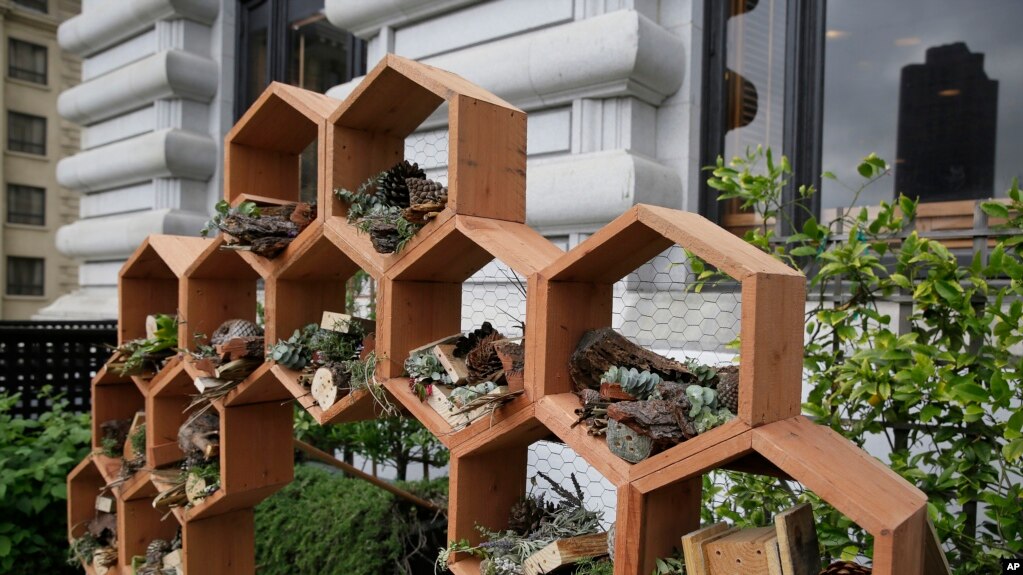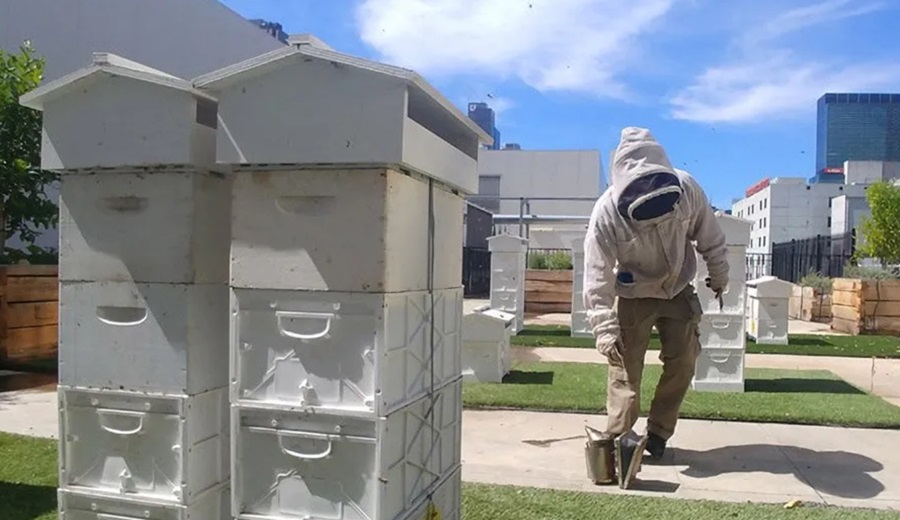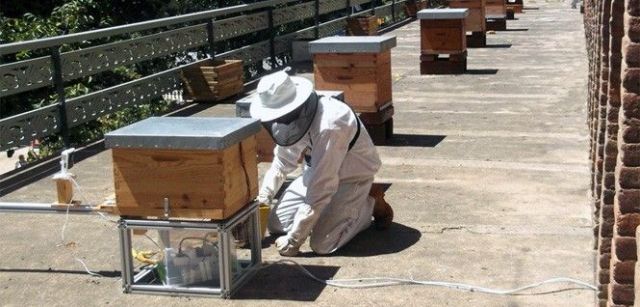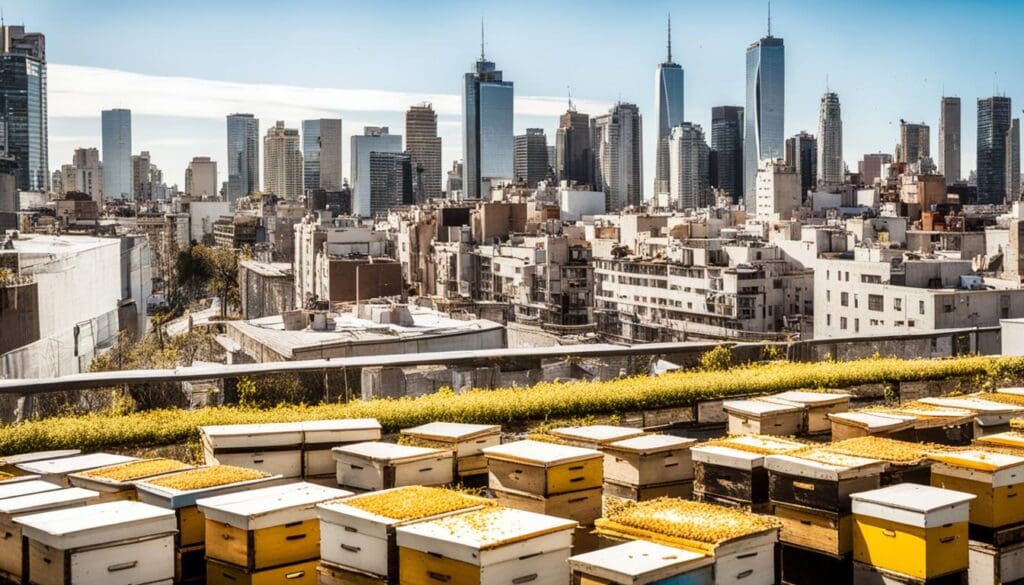Did you know that high above the busy streets of Buenos Aires, there exists a secret society of urban beekeepers? These dedicated individuals are turning the city’s rooftops into buzzing havens for honey production. Through their innovative rooftop beekeeping practices, they are not only transforming the cityscape but also redefining our perception of urban agriculture.
Table of Contents
- The Rise of Rooftop Beekeeping in Buenos Aires
- Marta Mattone’s Vital Mission: Championing Bee Conservation in Buenos Aires
- The Bee-Friendly City: Buenos Aires’ Efforts in Supporting Urban Beekeeping
- The Benefits of Rooftop Beekeeping
- Challenges and Considerations in Rooftop Beekeeping
- Rooftop Beekeeping and the Future of Urban Agriculture
- Rooftop Beekeeping as a Community-Building Activity
- The Global Impact of Rooftop Beekeeping
Imagine the sight of Buenos Aires’ skyline, punctuated by vibrant beehives producing golden honey. It’s a fascinating juxtaposition of nature and urban life, but how did this unique form of urban beekeeping emerge? And what benefits does it bring to the city and its inhabitants?
In this article, we’ll delve into the rise of rooftop beekeeping in Buenos Aires, exploring the sustainable practices that make it possible. We’ll also take a closer look at the initiatives the city has taken to support and promote urban beekeeping. Additionally, we’ll uncover the myriad benefits of rooftop beekeeping, from increased honey production to the promotion of biodiversity. And as we delve deeper, we’ll address the challenges and considerations that come with rooftop beekeeping, as well as its impact on the future of urban agriculture.
Interesting in Studying Spanish in Buenos Aires? Start your Classes with VAMOS Academy
So, join us on this journey as we uncover the secrets of Buenos Aires’ rooftop beekeepers and their fascinating contribution to sustainable beekeeping in the heart of a bustling metropolis.


The Rise of Rooftop Beekeeping in Buenos Aires
Rooftop beekeeping in Buenos Aires has experienced a significant rise in recent years, driven by the expansion of urban areas and the need to find suitable locations for traditional beekeeping practices. This unique approach to beekeeping utilizes unused rooftop spaces to host beehives, offering a range of benefits for both bees and the community.
The Benefits of Rooftop Beekeeping
- Increased honey production in urban areas: Rooftop beekeeping provides a local and sustainable source of honey, reducing the carbon footprint associated with long-distance transportation.
- Promotion of sustainable beekeeping practices: By utilizing unused rooftop spaces, beekeepers contribute to the preservation of urban environments and promote sustainable agriculture.
- Reduced travel distance for bees: Bees in rooftop hives have a shorter distance to travel in search of nectar sources, minimizing the energy expenditure required for foraging.
- Promotion of biodiversity: Rooftop beekeeping helps support urban biodiversity by providing a habitat for bees and attracting a diverse range of pollinators.
- Increased awareness about the importance of bees: Rooftop beekeeping initiatives raise awareness among urban dwellers about the critical role bees play in food production and ecological balance.
This image illustrates the benefits of rooftop beekeeping, showcasing how it contributes to sustainable practices, honey production, and biodiversity in urban areas.
Rooftop beekeeping has become a popular and effective solution for cities like Buenos Aires, where space constraints pose challenges for traditional beekeeping. By harnessing underutilized rooftops, beekeepers are not only increasing honey production but also creating a more sustainable and bee-friendly environment.
Marta Mattone’s Vital Mission: Championing Bee Conservation in Buenos Aires
The Bee-Friendly City: Buenos Aires’ Efforts in Supporting Urban Beekeeping
Buenos Aires is dedicated to creating a bee-friendly city that supports and promotes rooftop beekeeping. The government has implemented various bee-friendly city practices to ensure the safety of beekeepers, the surrounding community, and to foster the growth of the Argentina beekeeping industry.
Regulations and Guidelines
The government has established regulations and guidelines that govern the establishment and operation of rooftop apiaries. These measures ensure that beekeepers adhere to best practices and maintain the highest standards of safety and hygiene. By regulating rooftop beekeeping, Buenos Aires guarantees the well-being of both the bees and the community.
Workshops and Educational Programs
Buenos Aires goes beyond regulations by organizing workshops and educational programs to raise awareness about the importance of bees and rooftop beekeeping. These initiatives aim to engage and educate the public, promoting a deeper understanding of sustainable beekeeping practices and encouraging more residents to become involved in this eco-friendly activity.
Moving To Buenos Aires? We can get you an Argentina student visa
The city actively advocates for the growth of the Argentina beekeeping industry. By supporting rooftop beekeeping, Buenos Aires creates opportunities for local beekeepers to thrive and contribute to the production of high-quality honey. The city’s efforts in promoting beekeeping also play a crucial role in preserving the biodiversity of the region and maintaining a healthy ecosystem.
Benefits of Buenos Aires’ Bee-Friendly City Practices
Buenos Aires’ dedication to bee-friendly city practices has far-reaching benefits:
- Promotes sustainable beekeeping practices in urban areas
- Enhances biodiversity within the cityscape
- Supports local beekeepers and the Argentina beekeeping industry
- Increases honey production in the city
- Raises awareness about the importance of bees in food production
Through their efforts, Buenos Aires is setting an example for other cities around the world to create bee-friendly environments and embrace rooftop beekeeping as a sustainable practice.


| Benefits of Bee-Friendly City Practices | Details |
|---|---|
| Promotes sustainable beekeeping practices in urban areas | Create regulations and guidelines to ensure the safety and well-being of beekeepers and the surrounding community. |
| Enhances biodiversity within the cityscape | Provides a habitat for bees and supports pollination, contributing to the preservation of local flora and fauna. |
| Supports local beekeepers and the Argentina beekeeping industry | Creates opportunities for local beekeepers to thrive and contribute to the production of high-quality honey. |
| Increases honey production in the city | Utilizes urban spaces to host beehives, resulting in a local and sustainable source of honey. |
| Raises awareness about the importance of bees in food production | Organizes workshops and educational programs to educate the public about bees’ vital role in pollination and food security. |
The Benefits of Rooftop Beekeeping
Rooftop beekeeping in Buenos Aires offers numerous benefits. Firstly, it contributes to increased honey production in the city, providing a local and sustainable source of honey.
By keeping beehives on rooftops, beekeepers can take advantage of the abundant nectar sources available in urban areas. The diverse flora and vegetation found in cities provide a wide variety of nectar and pollen for bees to collect, resulting in higher honey yields. This local honey production not only benefits beekeepers and local businesses but also allows residents to enjoy fresh and high-quality honey straight from their own city.
Table: Rooftop Beekeeping Benefits
| Benefits | Description |
|---|---|
| Increased Honey Production | Rooftop beekeeping utilizes the abundant nectar sources found in urban areas, resulting in higher honey yields and supporting the local honey industry. |
| Promotes Biodiversity | Rooftop beehives serve as havens for bees and contribute to the pollination of nearby plants and trees, helping to preserve urban biodiversity. |
| Reduces Environmental Impact | By providing alternative pollinators, rooftop beekeeping helps reduce the environmental impact of extensive agriculture and supports sustainable food systems. |
Rooftop beekeeping also helps improve biodiversity in urban areas. Bees play a vital role in pollination, and by creating habitats for bees on rooftops, cities can support the pollination of nearby plants, trees, and urban gardens. This increased pollination activity not only leads to improved yields for local farmers and gardeners but also contributes to the overall health and abundance of urban flora.
Additionally, rooftop beekeeping helps reduce the environmental impact of extensive agriculture. Traditional agricultural practices often rely heavily on commercial pollination services, which require the transportation and management of beehives over long distances. Rooftop beekeeping provides an alternative source of pollination, reducing the need for extensive transportation and decreasing the carbon footprint associated with conventional agriculture.
Overall, rooftop beekeeping in Buenos Aires offers a range of benefits, from increased honey production to promoting biodiversity and reducing the environmental impact of agriculture.


References:
- “Beekeeping in Urban Areas.” Ontario Beekeepers’ Association, www.ontariobee.com/beekeeping-in-urban-areas.
- Smith, T.L., et al. “Urban Beekeeping: Are the Buzzy Benefits Worth the Sting?” Journal of Economic Entomology, vol. 111, no. 2, 2018, pp. 395-402.
Challenges and Considerations in Rooftop Beekeeping
Although rooftop beekeeping in Buenos Aires offers numerous benefits, it also comes with its fair share of challenges and considerations. The maintenance of beehives on rooftops requires careful planning and monitoring to ensure the well-being and productivity of the bees. Several factors need to be taken into account to tackle these challenges effectively.
Weather Conditions
One of the primary considerations in rooftop beekeeping is the impact of weather conditions on the beehives. Bees are sensitive to extreme temperatures, strong winds, and excessive rainfall. Therefore, beekeepers must take necessary measures, such as providing shelter and insulation, to protect the colonies from adverse weather conditions.
Availability of Nectar Sources
The availability of abundant and diverse nectar sources is crucial for the health and productivity of the beehives. In urban areas, limited green spaces and monoculture landscapes can pose challenges in providing a varied diet for the bees. Rooftop beekeepers need to ensure that there are sufficient floral resources nearby to support the bees’ nutritional needs.
Potential Exposure to Pesticides
Rooftop beehives might be exposed to pesticides due to nearby agricultural activities, gardens, or ornamental plantings. Pesticide exposure can have detrimental effects on bee health. Beekeepers must carefully select and monitor the surroundings to minimize the risk of pesticide contamination and ensure the safety of the bees.
Scaling up Rooftop Beekeeping
While rooftop beekeeping has gained popularity in Buenos Aires, scaling up operations on a larger scale can be challenging. The Argentina beekeeping industry needs to develop sustainable strategies for expanding rooftop beekeeping across the city. This includes addressing logistical issues, ensuring proper training and support for beekeepers, and establishing effective management practices.
Ensuring Long-Term Sustainability
Long-term sustainability is crucial for the success of rooftop beekeeping in Buenos Aires. Beekeepers must prioritize the health and well-being of the bees, implement sustainable practices, and actively contribute to the conservation of the local bee populations. Continuous monitoring, research, and adaptation of best practices are essential to maintain the longevity of rooftop beekeeping in the city.
Overcoming these challenges and considerations is vital to ensure the success and growth of rooftop beekeeping in Buenos Aires. With proper planning, awareness, and collaborative efforts from beekeepers, policymakers, and the community, rooftop beekeeping can continue to thrive and contribute to the sustainable development of the Argentina beekeeping industry.


Rooftop Beekeeping and the Future of Urban Agriculture
Rooftop beekeeping is revolutionizing urban agriculture as cities globally grapple with how to sustainably produce food in densely populated areas. With limited space on the ground, the utilization of rooftops for beekeeping has become an innovative solution that combines the benefits of sustainable beekeeping with urban agriculture practices.
Rooftop beekeeping not only provides a local source of honey but also has a significant impact on the overall urban ecosystem. By promoting biodiversity and raising awareness about the vital role of bees in food production, this practice contributes to the creation of a more sustainable and resilient urban environment.
One of the key advantages of rooftop beekeeping is its ability to enhance urban agriculture initiatives. Bees play a crucial role in pollination, ensuring the reproduction of plants and resulting in higher crop yields. By placing beehives in urban areas, rooftop beekeeping helps ensure that nearby gardens, parks, and green spaces have access to effective pollinators, thus supporting a thriving urban agriculture landscape.
Promoting Biodiversity
Rooftop beekeeping contributes to the promotion of biodiversity within the urban setting. The presence of beehives on rooftops provides a habitat for bees, encourages the growth of pollinator-friendly plants, and fosters the development of diverse ecosystems. This biodiversity has a cascading effect, benefiting not only bees and plants but also other organisms within the urban environment.
Creating Awareness
Rooftop beekeeping serves as an educational tool that creates awareness about the importance of bees in food production. By bringing beekeeping closer to urban dwellers, it highlights the vital role of bees in ensuring a sustainable and secure food supply. This awareness can inspire individuals to take action, such as planting pollinator-friendly gardens or supporting local beekeeping initiatives.
The future of urban agriculture relies on innovative practices such as rooftop beekeeping. By harnessing the power of bees and utilizing untapped urban spaces, we can create sustainable food systems that support both human and environmental well-being.
| Benefits of Rooftop Beekeeping for Urban Agriculture | Description |
|---|---|
| Promotion of Biodiversity | Rooftop beekeeping creates habitats for bees and supports the growth of pollinator-friendly plants, fostering biodiversity within urban areas. |
| Enhanced Pollination | By placing beehives on rooftops, nearby urban gardens, parks, and green spaces have access to effective pollinators, resulting in higher crop yields. |
| Education and Awareness | Rooftop beekeeping raises awareness about the importance of bees in food production, inspiring individuals to support sustainable practices and initiatives. |
Rooftop Beekeeping as a Community-Building Activity
Rooftop beekeeping in Buenos Aires has not only transformed the cityscape but has also become a community-building activity. Beekeeping groups and organizations have formed to support and encourage rooftop beekeeping initiatives. These groups organize events, workshops, and educational programs to engage the community and raise awareness about the importance of bees and sustainable beekeeping practices.
Rooftop beekeeping has brought together individuals from diverse backgrounds, fostering a sense of community and shared responsibility for environmental sustainability. Through beekeeping, people develop a deeper connection with nature and gain a better understanding of the vital role bees play in our ecosystem.
The Global Impact of Rooftop Beekeeping
The impact of rooftop beekeeping extends beyond Buenos Aires. Urban beekeeping is a global phenomenon that is gaining momentum in cities around the world. The practice contributes to increased honey production, supports pollination efforts, and promotes sustainable food systems. Rooftop beekeeping serves as a model for other cities looking to integrate beekeeping into their urban landscapes and create bee-friendly environments.
| Benefits of Rooftop Beekeeping | Impact |
|---|---|
| 1. Increased Honey Production | Urban beekeeping helps meet the growing demand for local and sustainable honey production, reducing reliance on imported honey. |
| 2. Pollinator Support | Bees play a crucial role in pollinating plants and crops. Rooftop beekeeping helps ensure a healthy population of pollinators, supporting food production and ecosystem balance. |
| 3. Sustainable Food Systems | Rooftop beekeeping promotes sustainable food systems by increasing access to fresh, local honey and encouraging community engagement in urban agriculture initiatives. |
| 4. Biodiversity Enhancement | By providing a habitat for bees in urban areas, rooftop beekeeping contributes to biodiversity enhancement by supporting the growth of diverse plant species. |
| 5. Environmental Awareness | Rooftop beekeeping raises awareness about the importance of bees in our ecosystem and encourages individuals to adopt sustainable practices in their own lives. |
Rooftop beekeeping is not limited to a single city or country. Its global impact is evident in the increasing number of urban areas embracing this practice. By incorporating rooftop beekeeping into their landscapes, cities worldwide can create a positive impact on honey production, pollination efforts, sustainable food systems, biodiversity, and environmental awareness.


Maria Olson
At VAMOS Academy, I craft stories sprinkled with my love for exploration and food. Whether it’s the tang of a local dish or the rhythm of a new dialect, I bring these experiences to you. Ready for an adventure that tickles your taste buds and ignites your wanderlust? Let’s embark on this journey together, one story and one bite at a time.
Hey there! I’m Maria Olson, your go-to nomad with a suitcase in one hand and a pen in the other, forever caught in the dance of Buenos Aires’ energy and Malaga’s serene vibes. My life’s an open book of travels, stitched together by the countless cultures I’ve embraced and the languages that now flow from my tongue as easily as my native speech. Speaking Spanish, English, French, German, and Russian isn’t just a party trick; it’s my way of unlocking the world’s secrets, one conversation at a time.
But let’s talk about the real spice of life—food. My adventures are nothing without the flavors I’ve savored and the culinary treasures I’ve unearthed along the way. Whether it’s diving into Argentina’s vibrant markets or sipping on sangria in a hidden corner of Spain, I bring these experiences to the table, sharing a slice of the world through my tales.
Crafting blogs for VAMOS Academy, I blend my wanderlust with a dash of creativity to serve up content that’s as unique as the journeys that inspired them. So, if you’re itching for adventure, hungry for a taste of the unknown, or simply curious about the art of language, you’re in good company.




